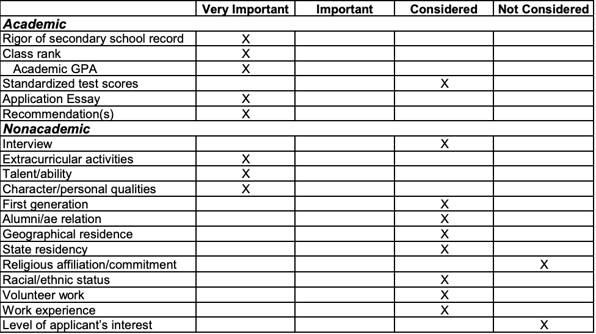Yale University Admissions Profile

Introduction
Yale University, one of the most prestigious institutions in the world, is known for its academic excellence, vibrant campus life, and commitment to fostering intellectual curiosity. Aspiring students from all walks of life aspire to be part of the Yale community and contribute to its rich history. In this comprehensive article, we delve into the Yale University admissions profile, shedding light on the key factors that shape the application process, the qualities Yale seeks in its applicants, and valuable insights for prospective students. If you're ready to embark on a journey of intellectual discovery and personal growth, read on to uncover the secrets behind Yale's admissions process.
Yale Admissions Profile
Yale University, located in New Haven, Connecticut, has a highly selective admissions process that considers various aspects of an applicant's profile. Understanding the Yale admissions profile is crucial for prospective students aiming to secure a place at this esteemed institution. Let's explore the essential components of the Yale University admissions profile to gain valuable insights into the application process.
Below are tables highlighting how Yale evaluates each applicant through information published in the Common Data Set, a resource that compiles a standardized list of data items provided by universities about their admissions profiles.
Relative importance of each of the following academic and nonacademic factors in your first-time, first-year, degree-seeking general (not including programs with specific criteria) admissions decisions

SAT and ACT Policies


Academic Excellence: A Strong Intellectual Foundation
Yale University places significant emphasis on academic excellence. The admissions committee evaluates an applicant's high school academic record, including course selection, grades achieved, and overall GPA. Yale seeks students who have challenged themselves academically, displayed intellectual curiosity, and excelled in their coursework. Rigorous classes, advanced placement courses, and a strong academic foundation are all factors that can positively impact an applicant's candidacy.
Standardized Test Scores: Demonstrating Aptitude
Standardized test scores, such as the SAT or ACT, play a role in the evaluation process at Yale University. While Yale takes a holistic approach to admissions, strong performance in standardized tests can enhance an applicant's profile. High scores in critical reading, writing, and math can demonstrate an applicant's intellectual capabilities and preparedness for the rigorous academic environment at Yale.
Personal Characteristics: Embracing Intellectual Curiosity
Yale values personal characteristics that align with its mission and community. Applicants who exhibit intellectual curiosity, creativity, a passion for learning, and a desire to make a positive impact are highly sought after. Through essays and other application components, applicants have the opportunity to highlight their unique perspectives, experiences, and aspirations that make them a good fit for Yale.
Extracurricular Engagement: Pursuing Passions and Leadership
Yale University values applicants who have shown active involvement in extracurricular activities. Participation in clubs, sports, community service, research, and other pursuits showcases an applicant's diverse interests and their ability to contribute meaningfully to the Yale community. Yale seeks individuals who have demonstrated leadership skills, collaboration, and a commitment to making a difference.
Recommendations: Testimonials of Character and Potential
Strong letters of recommendation can provide valuable insights into an applicant's character, abilities, and potential for success. Yale requires two teacher recommendations that shed light on an applicant's academic achievements, personal qualities, and potential contributions to the Yale community. Selecting recommenders who know the applicant well and can speak to their strengths and accomplishments is crucial.
Essays: Expressing Personal Narratives
Yale University places great importance on the essays as they provide applicants with an opportunity to convey their personal narratives, perspectives, and aspirations. The essays allow the admissions committee to gain insight into an applicant's character, values, and intellectual curiosity. Crafting authentic, thoughtful, and well-written essays can make a significant difference in the admissions decision.
Supplemental Essays in Yale University's Admissions Process
In Yale University's comprehensive admissions process, the supplemental essays play a pivotal role in helping the admissions committee gain a fuller picture of each applicant. Through these essays, applicants have the opportunity to showcase their personality, intellectual curiosity, and commitment to their communities. We have provided examples from the 2022-2023 admissions cycle as this years supplemental essays are slightly different. Nonetheless, the examples provided give an outstanding framework for what Yale looks for in an applicant.
For the 2023-2024 admissions cycle, Yale University requires two types of supplemental essays: short answer questions and two longer essays. Let's delve into the details of each:
Short Answer Questions
Yale starts with several short answer questions that must be answered within a limit of 200 characters or approximately 35 words. The questions typically address the applicant's academic interests, personal goals, and their potential fit within the Yale community. For example, one question may ask students what they like to learn in their free time, while another might ask them about an aspect of Yale that they are excited about.
Long Essays
In addition to the short answers, Yale requires two longer essays.
The first is a 250-word essay where applicants respond to one of three prompts that aim to assess their intellectual vitality, leadership skills, or commitment to community service.
The second essay, which should also be around 250 words, is the "Why Yale" essay. In this piece, applicants should elaborate on their specific interests in Yale's academic programs, residential colleges, student organizations, or other resources. This essay provides applicants with a chance to show that they have done their homework on Yale and understand exactly how they can fit into and benefit from the university community.
Yale's supplemental essays offer students the chance to present a more complete picture of their interests, motivations, and experiences. Applicants should approach these essays with honesty and specificity, focusing on their unique stories and genuine interest in Yale. Well-written, reflective, and authentic essays can greatly enhance an application and highlight a student's fit with Yale's dynamic and academically rigorous environment.
Remember, Yale University, like other Ivy League schools, adopts a holistic approach to admissions, and the supplemental essays are an integral part of this process. They allow the admissions committee to understand the person behind the application and assess how they might contribute to and benefit from the university's diverse and intellectually stimulating community.
Sample Essays
Prompt: Yale’s extensive course offerings and vibrant conversations beyond the classroom encourage students to follow their developing intellectual interests wherever they lead. Tell us about your engagement with a topic or idea that excites you. Why are you drawn to it?
Example:
Programming is a language I longed to learn and understand, so I bought the C++ programming language when I was fourteen to program my own video games. My lofty aspirations were stymied quickly: I couldn’t program a window with a button that closed the window.
Computer science classes in high school helped me progress. As I continued to learn coding, I began to become interested in AI. Artificial intelligence has kindled human imagination since before we even had the word “robot”, the Golem, for instance, or Frankenstein’s monster.
Computers think very differently than we do. An AI will go about accomplishing tasks very differently from a human. Machines are, unsurprisingly, more linear thinkers than we are. So, it is unsurprising that speaking with them is still impossible, if you’re looking for a real conversation.
But we have Siri and Alexa. Talking to machines has become an obsession of mine. I spent four hours in one session alone speaking with chatbots online. I believe that, within our lifetimes, we will take computers further, perhaps even to the point where we can “hang out” with them, and just chat. At that point, programming language will become “language”, and then the future will be now. As for me, C++ is only the beginning. Soon, we will be able to genuinely talk with artificial intelligences.
Prompt: Reflect on a community to which you feel connected. Why is it meaningful to you? You may define community however you like.
Example:
I play a lot of Dungeons & Dragons, or D&D. Thanks to popular shows like Stranger Things, it’s a more accepted hobby than it used to be, but it’s still seen as pretty niche, and I’ve been called some pretty unflattering words as a result.
Every year, I go to as many conventions as I can. These fan conventions, or cons, are places where people who play D&D, watch anime, read Lord of the Rings, and debate the philosophical implications of video games go to, meet their sci-fi-fantasy heroes, and “geek out” as much as possible.
This community is so welcoming, and I can’t describe it any better than seeing a person dressed in a demon monster costume talking with a middle-aged man dressed as Sailor Moon like it was the most natural thing in the world.
It’s a place for the outliers to go and realize that we aren’t so strange after all. Through connections I’ve made at cons, I have built an online community that I can go to for help, for answers, for support, and for friendship. We’re all very into online connectivity, so staying in touch is a breeze, and always fun.
Through this community’s support, I have increased my self-confidence, made some contacts in industries that I’m interested in, such as gaming and comics, and learned how to be more accepting of myself and others.
Prompt: Reflect on something that has given you great satisfaction. Why has it been important to you?
Example:
I’ve never considered myself to be a very physical guy – I'm the classic tech-dweeb type – and I mostly spend my time studying mathematics and statistics. I stay indoors, I’m sedentary, and I have no sports or athletics in my hobbies.
Or, at least, I didn’t use to. My buddy Rod got sick about three years ago, and a lot of it had to do with malnutrition. I didn’t realize that you could get that sick with poor diet and exercise. I knew it was bad for you, but I never pictured it.
That’s when I read up on how to be healthier and started jogging. Of course, I continued to do calculations. “If I jog at 6 m/ph for 30 minutes, I’ll have covered 3 miles, and over the course of four weeks…” and on and on like that.
I found my love of statistics could fuel my jogging, letting me keep track of achievements and set goals.
Last summer I ran my first marathon. Well, by “ran” I mean I mostly walked it or jogged, but I completed it. I’m not going to the Olympics, but I finished a marathon. It’s important to me because it represents perseverance and attaining goals, and because I broke out of a set path to become somebody new. I don’t have to stop being a tech-dweeb to love athletics, or vice-versa, and opening up my world means a bigger horizon – one I’m jogging towards right now.
Yale University Application Deadlines
Comprehending Yale University's application deadlines is an essential aspect of the application journey for prospective students. Yale offers two main application options: Single-Choice Early Action (SCEA) and Regular Decision (RD). Both paths have their respective deadlines, allowing students to choose the path that best aligns with their college application timeline.
Single-Choice Early Action
Yale's SCEA program is intended for students who consider Yale as their top choice. The SCEA deadline is November 1. Under this plan, applicants may not apply to any other college's Early Decision or Early Action program, although they can apply to other colleges under Regular Decision or Rolling Admissions plans.
SCEA applicants will receive admissions decisions in mid-December. Those admitted through SCEA have until May 1 to accept or decline their offer. This allows them time to apply for financial aid, compare offers from other colleges, and make an informed decision.
Regular Decision
Regular Decision applications to Yale must be submitted by January 2. This option affords students more time to refine their applications, and perhaps add additional accomplishments from their senior year.
Yale releases Regular Decision notifications in late March. Admitted Regular Decision students, like their SCEA counterparts, have until May 1 to accept or decline their offer, ensuring all admitted students have ample time to consider their options.
Financial Aid Application
To be considered for financial aid at Yale, students should submit their financial aid application by March 1. Yale has a robust financial aid program that meets 100% of demonstrated financial need for all admitted students, regardless of citizenship status.
It's important to note that Yale's application deadlines are strict. Applications must be submitted by 11:59 PM Eastern Standard Time (EST) on the respective due dates. Late applications are usually not considered.
The application process at Yale University is rigorous and necessitates careful planning and time management. These deadlines represent just the first step in the journey towards becoming a part of the Yale community. Prospective Yalies need to display their academic excellence, character, creativity, and potential in their application to be successful in this competitive process.

Frequently Asked Questions
What is the acceptance rate at Yale?
Yale University's acceptance rate is typically around 6-7%, making it one of the most competitive institutions to gain admission to.
Does Yale require interviews for all applicants?
Does Yale University consider demonstrated interest in admissions decisions?
While Yale University does not formally track demonstrated interest, showing genuine enthusiasm for the university can positively impact an applicant's candidacy. Engaging with Yale's resources, attending information sessions, and visiting campus (when possible) can demonstrate a strong interest in becoming part of the Yale community.
Conclusion
Securing admission to Yale University requires a combination of academic excellence, intellectual curiosity, and a desire to make a positive impact on the world. By understanding the various components of the Yale University admissions profile and showcasing your unique strengths, you can increase your chances of joining the esteemed Yale community. So, dream big, think critically, and let your passion for knowledge and growth guide you toward unlocking the doors to intellectual discovery at Yale University.
